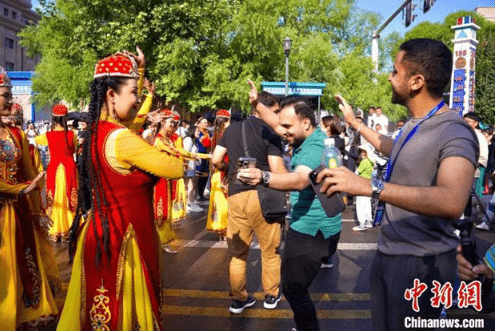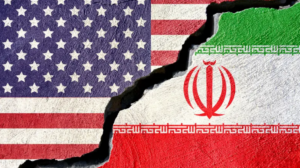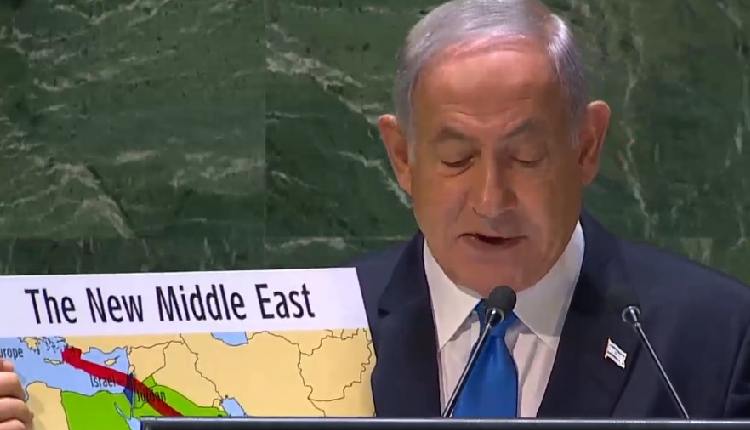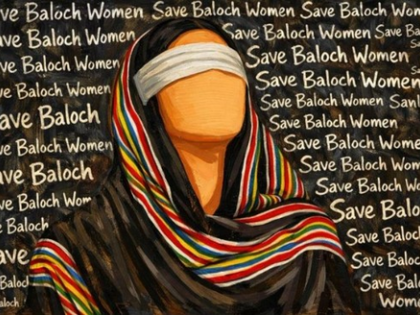
A group of 10 Pakistan-based businessmen who praised China’s policies during a trip to Xinjiang this month have been blasted by Uyghur activists for parroting Beijing’s propaganda and turning a blind eye to China’s oppression of the roughly 12 million Uyghurs living there.
The businessmen, most of whom were ethnic Uyghurs, came on the eight-day trip funded by the Chinese government from the Ex-Chinese Association Pakistan, established in 2007 with China’s support to promote the welfare of the Uyghur community in the country.
In social media posts, the delegation said they saw Uyghurs and other Muslims living happily and peacefully in the far-western region, and that China was actively developing the region. They also dismissed Western reports of Chinese atrocities.
Photos and videos from the trip, which began on Aug. 20 and included stops in Urumqi, Korla and Kashgar, show members of the delegation — two of whom wore doppas, or Uyghur skullcaps — raising Chinese flags, attending special banquets and participating in events organized by officials.
The posts showed them watching musical performances and proclaiming that “Muslims of all ethnicities are living happily in Xinjiang.”
The trip is the latest by officials from mostly Muslim countries organized by Beijing in an effort to dispel allegations of genocide and crimes against humanity against Uyghurs in the region, activists say.
An estimated 1.8 million Uyghurs have been put into concentration camps scattered around Xinjiang, although Beijing has described them as job training facilities that are now mostly closed.
But this was the first time that a foreign delegation with ethnic Uyghurs from a Muslim-majority country was invited to the far-western region, Uyghur activists said.
“Despite having relatives in prison, they remain silent about East Turkestan because they benefit from the Chinese consulate” in Pakistan, said Omer Khan, founder of the Pakistan-based Omer Uyghur Trust, which assists Uyghurs living in the country, using Uyghurs’ preferred name for Xinjiang.
“Their actions bring shame not only to Uyghurs in their homeland, but also to Uyghurs worldwide,” he said.
RFA could not reach the Ex-Chinese Association Pakistan for comment.
Helping cover up?
Activists and Uyghurs abroad said they found the photos and videos disturbing, mainly because most Uyghurs living outside China cannot communicate with their relatives in Xinjiang or obtain information about those who have been detained there.
Uyghurs in Pakistan are outraged by the delegation members, seeing them as aiding and abetting China’s efforts to cover up the Uyghur genocide, Khan said.
Nearly 1,000 Uyghur families live in Gilgit and Rawalpindi, Pakistan, where their ancestors migrated from Xinjiang 50 to 60 years ago. However, they are stateless and do not have Pakistani citizenship.
which included association chairman Muhammad Nasir Khan and Nasir Khan Sahib, former chairman of the Islamabad Chamber of Commerce and Industry — began posting on social media in Urdu and English as soon as they arrived in Xinjiang, Khan said.
In Korla, the second-largest city by population in Xinjiang, they participated in the city’s “Intangible Cultural Heritage Week” as part of China’s “Xinjiang is a wonderful place” propaganda campaign designed to counter criticism of its policies in the restive, heavily Muslim region, he said.
The Chinese press covered the delegation’s visit, claiming that they witnessed peace, stability, economic development, religious harmony and cultural prosperity in the region.
State-controlled media reports publicized the delegation’s statement: “We can see people dancing happily all the time. We really feel that the life of the people in Xinjiang is sweeter than honey.”
Abdul Aziz, a Uyghur businessman from Gilgit who participated in the Xinjiang trip, posted short videos on Facebook titled “Xinjiang trip diaries,” showing the delegation visiting exhibitions on counter-terrorism and anti-extremism, the International Grand Bazaar and the Islamic Institute of Xinjiang in Urumqi and tourist sites in other places.
RFA’s attempts to contact Abdul Aziz via his social media platforms were unsuccessful.
Pakistan under pressure
Hena Zuberi, director of the human rights group Justice for All, described the situation as deeply saddening, saying Beijing is using such visits to justify its genocidal policies under the guise of China-Pakistan friendship.
Pakistan has come under pressure from Beijing because of the China-Pakistan Economic Corridor, a 3,000-kilometer (1,800-mile) Chinese infrastructure network project under the Belt and Road Initiative to foster better trade with China, and secure and reduce travel time for China’s Middle East energy imports.
“If they took a stance and they said and asked the hard questions and demanded to know what was happening to those Muslim people in the Uyghur region, I think the situation would be different,” Zuberi said of the visiting delegates.






